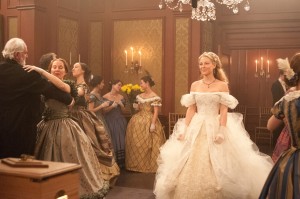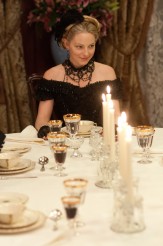
Anastasia Griffith in COPPER - Season 1 - “La Tempête” | ©2012 BBC AMERICA/Cineflix (Copper) Inc./George Kraychyk
Set in 1864 New York, most of BBC America’s COPPER, which has its first-season finale Sunday night at 10 PM, takes place in the mean streets of the slums of the Five Points neighborhood. Occasionally, however, the action moves to the wealthy enclaves of Manhattan, where policeman Kevin “Corky” Corcoran (Tom Weston-Jones) has contacts.
Among Corky’s high-society associates is Elizabeth Haverford, played by French-born/London-raised actress Anastasia Griffith. Griffith appeared in the 2004 feature remake of ALFIE, but has been working on U.S. television for awhile now, with recurring roles on DAMAGES, TRAUMA, ROYAL PAINS and ONCE UPON A TIME (the last as Kathryn, the Storybrooke “wife” of David/Prince Charming).
At a party thrown by BBC America promoting its present and upcoming series,Griffith talks about stepping back into the past to play a character with her eye on the future.
AX: Your character in COPPER, Elizabeth Haverford, is a member of the upper class …?
ANASTASIA GRIFFITH: I play a society lady, yeah. I play someone from England who’s come over, married a wealthy American gentleman who’s brought me over to Manhattan. We live on Fifth Avenue and we live in the high echelons of society and I become involved with the life of Manhattan, and that involves Corcoran. I’m very good friends with Robert Morehouse, so we end up having a community that stretches beyond Fifth Avenue and Twenty-Third Street.
My character really is in search of freedom, liberty, to break out of the constraints that she was born into. I think she left England thinking that she’d find a more liberal society, that she could believe more in the politics [in the U.S.]. She believes in freedom, whether that be for slaves, for herself or for the people who live in Five Points, and I think she’s frustrated by what she finds in Manhattan, and I think she’s constantly trying to break down those barriers and she’s ramming against it. She’s kept by her husband, but she, like a lot of women of that time with a conscience, would do a lot of charity work and was very involved in the Colored Orphans Society. You see her being involved with that. She’s very outspoken about the politics of the time and she wishes that she had a vote, she should absolutely have the right to vote, and she campaigns for that.
AX: Does she eventually become involved in more than the social sense with Corky?
GRIFFITH: Yeah. Things happen and, as you see at the end of the pilot, I meet him for the first time and there is an immediate connection between us, and that definite grows as time goes on and we become involved in all sorts of different ways. He’s a man of integrity and a man of honor, and he believes in justice. He follows his own passions and his own beliefs to a hilt, and I think my character finds that incredibly refreshing and honest, as do I.
AX: Did you do research into the history of Five Points in New York?
GRIFFITH: I’ve made it my mission to learn. I lived in New York for a bit, so I was kind of aware then – I went to the Lower East Side and I was kind of aware [of the history]. Ever since GANGS OF NEW YORK, that exposed me to the history of Manhattan a little bit, and through research, I figured it out a little bit more. [Five Points] was a slum. There were so many people living in just appalling accommodation and there was no sanitation and it was a really intense period of time to live down there. [The research] is very eye-opening, but I was always very aware of how privileged my character’s life was, albeit still a difficult life in other ways, on Twenty-Third Street. It’s a society where no one quite says the truth, no one says what they’re really thinking, and it’s very manipulative, and I think that sometimes Elizabeth Haverford has a respect for Five Points’ earthy honesty.
AX: Do you think that’s still the case with the upper classes?
GRIFFITH: No, I wouldn’t dare to comment on how they live their lives. I think it’s more down to individuals. I think plenty of people in the upper classes can be incredibly truthful and honest, and do good work with conscientious minds, and I think plenty of people in the working class can be not quite so honest. So I wouldn’t dare to comment.
AX: In the research that you did for the character, did you find anything specific that was helpful in playing her?
GRIFFITH: Oh, lots. Lots. I think for me a lot of it was about the practicality of being in those dresses and those costumes. You really understand that they would have to carry smelling salts in their purse at all times, because their expectation was that they would faint and they would collapse from the difficulty of wearing these clothes. That was a big thing. [The corsets] were so tight that [women] would have ribs taken out so that they could be tighter – and this is all for aesthetics, to please the opposite sex and to be this dolly shape that the men seemed to want to have their wives look like. So that was interesting, and I did a lot of research about the expectations of women at that time – whether they could have extramarital sexual relations, whether they couldn’t, the fact that the husbands would sleep with prostitutes and that was okay with [the wives] and I would often find, to be honest, it was not only okay, it was kind of a relief, because it would mean that their husbands were being cared for elsewhere. A lot of these marriages weren’t love marriages. There was a lot of that stuff which I read, which was fascinating.
I think the relationship [between Elizabeth and her] husband is a tense one, I don’t think it was necessarily a love connection, and you have to watch it to see where that goes, but it informs a lot of my decisions.
AX: How was it dealing with the costumes? Did you feel like you had a rib removed by the end?
GRIFFITH: I did. It was challenging, to say the least.
AX: Did you ever feel faint from the constriction of your wardrobe?
GRIFFITH: At times. I mean, you have to be very careful about when you eat, when you don’t eat. The costumes are made for me in a very particular size, and so if I eat too much, they’re not going to do up, and there’s a lot of work that goes into them. So you have to be very conscientious about how you take care of yourself and how you spend your day, and there were days when it would just be too tight and I just made it looser a little, and over lunchtime, they’d have to undo it and take care of me.
AX: Are there things that you find attractive about the 1864 era?
GRIFFITH: Oh, a lot. I think it’s very visceral. Especially the Five Points. It’s very visceral and raw and sexual and tangible. That whole Five Points, to me, just watching it, I find it so sexy, honestly. And then to offset that with the incredibly correct and controlled aspects that my character plays, I find it so interesting, this conflict between Franka [Potente]’s character [Eva the madame] and my character, about how we lead our lives, is fascinating to me.
AX: Do the realistic-looking sets help?
GRIFFITH: They [the production company] spent a lot of money and they’re beautiful. They’re an amazing creation.
AX: What else would you like to say about COPPER right now?
GRIFFITH: I’m just incredibly proud to represent a woman who I think paved the say for the suffragettes. It’s these kinds of women who spoke out about what it is to be a woman, and what it should be to be a woman, and speak out for equality at a time when that just wasn’t being heard. I think it really paved the way for the kinds of lives we all lead now. I think that’s very important. It’s about people, it’s about human beings and human stories and this is as human as it gets.
AGREE? DISAGREE? LEAVE A COMMENT BELOW AND LET YOUR VOICE BE HEARD!
Related: Exclusive Interview with COPPER actor Kyle Schmid
Related: Exclusive Interview with COPPER actor Kevin Ryan about the BBC America series
Related: TV Review: COPPER – Season 1 – “Better Times Are Coming”
Related: TV Review: COPPER – Season 1 – “Arsenic and Old Cake”
Related: Exclusive Interview with COPPER star Ton Weston-Jones
Related: TV Review: COPPER – Season 1 – “La Tempête”
Related: TV Review: COPPER – Season 1 – “The Empty Locket”
Related: TV Review: COPPER – Season 1 – “In The Hands of an Angry God”
Related: TV Review: COPPER – Season 1 – “Husbands and Fathers”
Related: Exclusive Interview with COPPER star Franka Potente
Related: TV Review: COPPER – Season 1 Premiere – “Surviving Death”
Follow us on Twitter at ASSIGNMENT X
Fan us on Facebook at ASSIGNMENT X
Article Source:Assignment X
Article: Exclusive Interview with COPPER actress Anastasia Griffith
Related Posts:











